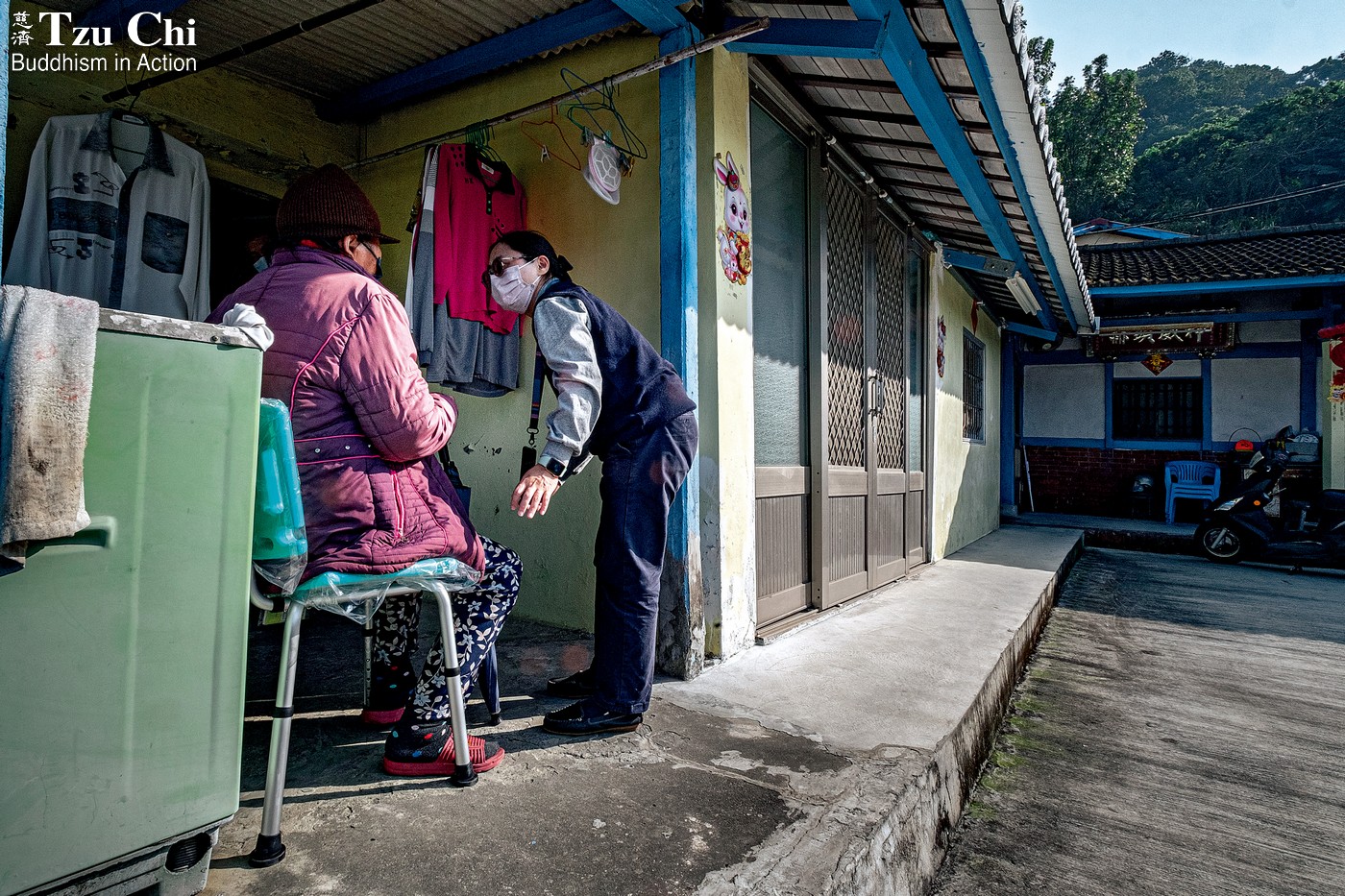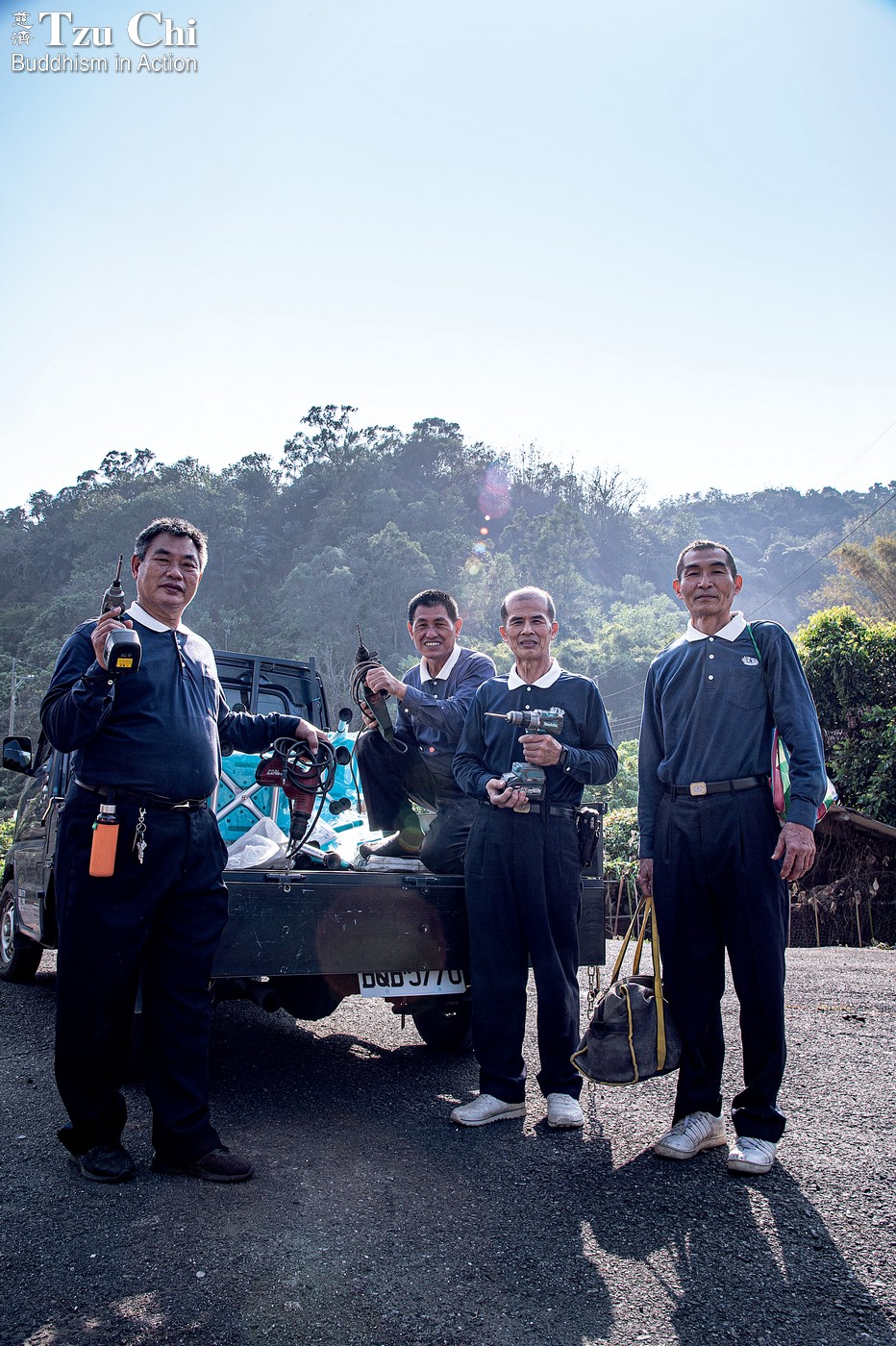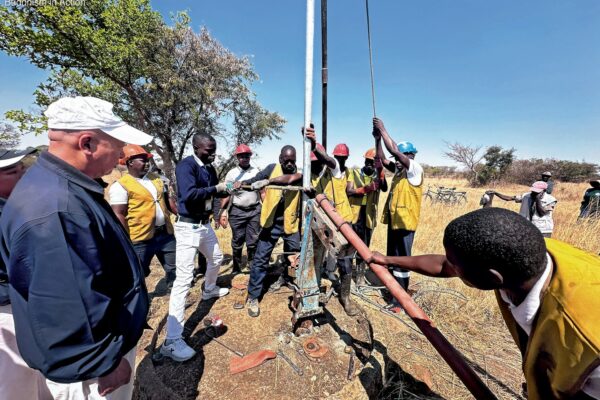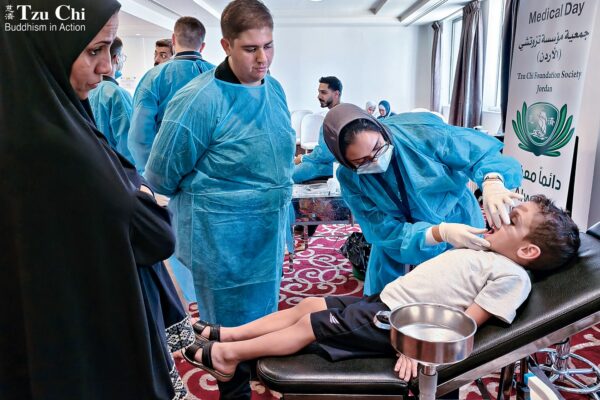By Hong Jing-jing
Edited and translated by Wu Hsiao-ting
Photos by Huang Xiao-zhe
The volunteer team in Tainan, Taiwan, consistently leads in evaluations across all categories in Tzu Chi’s home safety initiative. Over 200 households in the southern city are even slated to receive long-term support following repairs or modifications.
Tzu Chi’s home improvement program was initiated in 2020. Over the span of nearly three years, from the project’s inception until the end of 2022, Tzu Chi volunteers in Tainan City, southern Taiwan, have visited 133 neighborhoods. They’ve received 1,204 requests for assistance, conducted 1,149 home assessments, and completed repairs or modifications for 759 households. Among all the volunteers working in the cities and counties participating in the program, those in Tainan City have consistently excelled in every category, demonstrating a strong commitment to service.
Xu Ya-ling, a staff member at the Southern Social Welfare Office, in the Tzu Chi Department of Charity Mission Development, shared her experience in organizing this program. She recalled the large-scale briefings conducted to address volunteers’ concerns when the program was first launched. One of the questions that was addressed was why this charity service did not exclude wealthier people.
According to statistics from Taiwan’s Ministry of Health and Welfare, one out of every five to six older individuals have experienced a fall within the past year. For every ten falls, one to three result in injuries, a third of which require hospitalization. The average cost of hospitalization for each of these types of falls ranges between 90,000 to 130,000 New Taiwan dollars (US$3,000-4,330).
Falls can have serious consequences for the elderly, resulting in injuries and potentially confining them to bed. Moreover, the risk of experiencing subsequent falls is heightened, which often leads to a reduced willingness to walk and engage in social activities. This in turn can result in an increased demand for caregiving support in terms of both manpower and financial resources within households. On a larger scale, the cost of healthcare and social welfare escalate in response to these challenges.
Xu Ya-ling explained that Tzu Chi’s home safety initiative is a form of “preventative charity.” She emphasized that certain elderly individuals may lead financially stable lives, but because they live alone in remote mountainous areas and their needs often involve small-scale projects, professionals may be reluctant to undertake the necessary home improvement work for them. Additionally, some seniors lack awareness of home safety, while others, despite desiring to enhance their living environment, hesitate to seek assistance from their children, especially if they live far way. “So, why not extend a helping hand to ensure the home safety of elderly people in our society?” Xu asked.

From home visits to the installation of safety features, Tzu Chi social workers provide timely assistance based on professional assessments.
Support from communities
In fact, Taiwan’s city and county governments provide subsidies for housing repairs and home accessibility improvements, primarily targeting low-income households, older individuals from low- to moderate-income households, people with disabilities, and those who are unable to function independently. The amount of subsidy varies depending on the specific circumstances. But Xu explained that Tzu Chi takes a different approach. After conducting visits and assessing the actual needs of individuals, the foundation provides repair or modification assistance without any specific eligibility criteria or financial limitations for a project. An example is elderly individuals involved in farming. They are ineligible to apply for government subsidies because they receive farmers insurance benefits and do not qualify as low- to moderate-income households. But Tzu Chi will help these individuals if the home visit indicates they could benefit from it.
Xu provided an example of a 78-year-old woman living in Dongshan District, Tainan City. She lives with her two sons and a daughter-in-law. The senior uses a urinary catheter and relies on a wheelchair to get around. Her daughter-in-law suffers from cerebral palsy and experiences muscle atrophy in both legs, requiring her to crawl on the ground using her hands. Because the older woman receives farmers insurance benefits, owns a house and land, and lives with her two sons, they are classified as a regular household and cannot receive assistance from the government. Even though they may be eligible for the government’s home accessibility improvement services covered under its long-term care program, elderly individuals in rural areas often have limited awareness of such available resources and don’t know how to apply for such help. In response, Tzu Chi stepped in to assist this family by installing handrails to ensure the safety of both the older woman and her daughter-in-law in their daily activities. Cases involving similar regular households make up around 70 to 80 percent of the total in the foundation’s home improvement initiative, indicating a significantly high proportion.
Zhang Yu-ci, a colleague of Xu who is also involved in the home safety program, added, “No matter how small a project is, [as long as it addresses the needs of the elderly and improves their safety,] we will readily undertake it!”
Grandma Gui-hong, 70, experiences limited mobility as a result of polio. She relies on her electric scooter to travel to a community care center every weekday to collect meals. Worried about a hole in her ceiling and the potential danger of something falling through it, she sought help for the repair. Unfortunately, finding someone willing to take on such a small repair job proved challenging. After Tzu Chi volunteers fixed the hole for her, she repeatedly expressed her gratitude, saying that she could finally enjoy peaceful sleep.
A major characteristic of Tzu Chi’s home safety initiative is the integration of neighborly assistance. The foundation’s social workers and volunteers visit district chiefs, neighborhood leaders, and organizations that cater to the needs of the elderly within a community, with the aim of identifying those requiring assistance. As a result of this effort, over 80 percent of home improvement cases in Tainan City are reported by neighborhood leaders. For instance, Su Ming-tian (蘇明田), the chief of the Dongzheng neighborhood, and Wang Yuan-zheng (王元正), the chief of the Keli neighborhood, both in Dongshan District, spared no effort in compiling comprehensive lists of elderly individuals in need, enabling Tzu Chi volunteers to broaden their reach.
Chief Wang Yuan-zheng provided lists of over 70 households for Tzu Chi volunteers to visit. Among them was Mrs. Li, a senior who lives alone. Her son had been imprisoned for drug use, and she suffers from glaucoma, which caused her to lose sight in both eyes. As a result, she was unable to accompany her two grandchildren, whom she single-handedly raised, to school, and had no choice but to send them to foster care. Mrs. Li is accustomed to moving around her home by touching the walls as she walks. Volunteers installed handrails in her bathroom to ensure that she has the necessary support and stability while navigating the space. They also adjusted the height of a shower chair for her convenience. She gratefully expressed her appreciation, saying, “Tzu Chi is such a great organization, willing to help us underprivileged people.” Her greatest wish now is for her grandchildren to return to her side one day.
There are no Tzu Chi volunteers in the neighborhood of Guanshan, Nanhua District. But thanks to the help of the neighborhood chief, the foundation has been able to provide assistance there. One of the residents benefiting from Tzu Chi’s program was 79-year-old Mrs. Xu. She did not have access to an indoor bathroom, and had to wash herself outdoors by manually scooping up water. The large water tank she used for water storage was extremely dirty. Volunteers set up a simple shower room and provided a shower chair so that she could comfortably bathe herself.
Community members have assisted in the program, too. During home visits, local residents have readily volunteered as guides, offering their help to the Tzu Chi teams in locating the residences of the elderly on their lists.
In the Shengxian neighborhood, Dongshan District, Lin Zhuang-zhi (林莊智), a young man, made the decision to resign from his teaching job a few years ago and return home to take care of his parents, who had been injured in a traffic accident. He also started cultivating their family’s farmland, which had been neglected and left uncultivated. When he discovered that Lin Chun-xu (林春旭), a fellow villager, was a member of a Tzu Chi home improvement team, he proactively reported households in need of help and even accompanied Tzu Chi volunteers on their home visits, along with his mother.
Mrs. Huang was another enthusiastic resident in the Shengxian community. Despite the intense summer heat, she tirelessly rode her bicycle, wearing a bamboo hat, to guide volunteers during their home visits. The basket of her bicycle was always stocked with a variety of beverages, such as tea, coffee, and vegetable and fruit juices, offering the volunteers a refreshing source of hydration.

The designs of many old-fashioned bathrooms present underlying safety concerns. Tzu Chi’s home improvement initiative offers help within the constraints of existing living conditions, safeguarding the elderly.
Selfless service
Tzu Chi volunteers in Tainan City actively support the foundation’s home safety program through concrete actions. The number of repair and modification cases in the city has increased each year. Some have been assigned to professional workers while others are handled by volunteers. Social worker Zhang Yu-ci highlighted the work of the repair and modification team in Dongshan District. This dedicated team is made up of volunteers Lin Chun-xu, Zheng Zong-zhi, Xu Mao-zhong, Chen Ming-de (陳明德), Qiu Jun-lang (邱俊郎), and Shen Xin-fu (沈新富). They are known as the “Six Musketeers of Home Safety.” Each member brings his expertise to the team. Over the past three years, they have developed excellent teamwork and honed their skills with each project. In an effort to minimize expenses, the team procures and cuts all materials themselves instead of relying on external vendors. Zheng Zong-zhi personally sketches the dimensions of accessibility ramps or platforms to ensure enhanced precision and accuracy in their construction. They are incredibly dedicated. Even during the mourning period following his father’s passing, Xu Mao-zhong continued volunteering for the program without interruption.
Annan District has the highest number of neighborhoods among all the administrative districts in Tainan City. Chen Qiu-lai (陳秋來), a 65-year-old volunteer, has undergone knee surgery and needs support when getting up. She once slipped and fell at home due to a wet and slippery floor. “I myself need handrails, let alone older people in their 80s and 90s,” she said. “I have already visited over a dozen neighborhoods for the program, and am determined to visit all 51 neighborhoods in Annan District.”
Xu Ya-ling pointed out that promoting the home improvement initiative in urban areas presents a greater challenge because “neighborhood leaders in urban areas are less familiar with residents living in high-rise buildings.” As for rural areas, older houses often have bathrooms and toilets situated outside, posing safety risks, especially when navigating rough terrain. Moreover, elderly individuals in mountainous regions often worked as farmers when they were younger, resulting in hunchbacks and weakened joints in their old age, making them in greater need of handrails and other assistive devices.
Grandma A-ruan, a 93-year-old resident of Dongshan District, lives in a traditional three-section compound house. She receives assistance from a home care worker who visits her five days a week to cook for her. Her only companion is her 95-year-old sister-in-law, who resides in the same compound and is physically stronger. Grandma A-ruan has a delicate and slender frame, and her stooped posture makes it challenging for her to stand up straight. She relies on a bamboo stick for support while walking. Due to her unstable center of gravity, she is prone to falling. To improve her mobility, volunteers installed handrails in her home. Recognizing her difficulty in reaching the floor with her feet when getting out of bed, they also installed a bedside support for her.
Shen Xin-fu, one of the Six Musketeers, said, “Using our expertise to help elderly people in need is a wonderful way to form good affinities with them.” Warm-hearted people like Shen are more than happy to contribute to the home improvement program.

By using their skills to serve the elderly, volunteers participating in the home improvement program have also received an abundance of blessings and a sense of fulfillment.
Long-term care
“The completion of a home safety case doesn’t mark the end [of Tzu Chi’s involvement with an aid recipient]; rather, it signifies the beginning of a lasting commitment to care,” said Xu Ya-ling. Out of the 759 beneficiary households in Tainan City, 230 have been included in a long-term care list, through which volunteers provide continuous support and companionship.
The lives of the elderly undergo an instant transformation when a dimly lit corridor is suddenly illuminated by brighter lights, when a bathroom is equipped with sturdy handrails for support, or when a quiet living space resonates with the voices of visitors. Grandma Qing-hua, in her 80s, struggled with weakened eyesight due to glaucoma. Upon hearing that the volunteers visiting her wanted to capture beautiful photos of her, she promptly fetched her sunglasses from a room and put them on, continuously expressing how happy she was and how she had never dreamed that there would be such wonderful handrails available for her to use. Zhang Yu-ci emphasized that radiant smiles, such as those of Grandma Qing-hua’s, serve as the greatest source of encouragement for Tzu Chi’s home improvement program.
“Many elderly people dedicate their entire lives to society and their families yet hesitate to invest in their own safety by installing safety features in their homes,” Zhang said. “Launching the home safety program is our way of giving back to the older population in our society.” She stressed that there are still many seniors in need of care and expressed hope for more people to come together and create safer living environments within communities. This would help enable older people to age in peace and safety in the comfort of their own homes.
Volunteers revisited an older woman for whom they had installed safety features. They are pictured above singing a song to wish the woman well before leaving. The picture below shows the woman holding a gift from the volunteers. The Chinese characters on the package mean “love” and “thank you and best wishes.”



